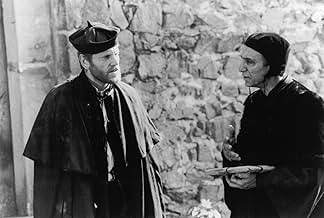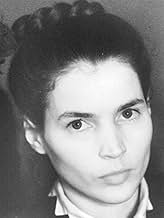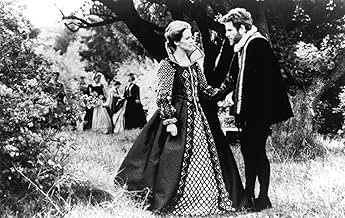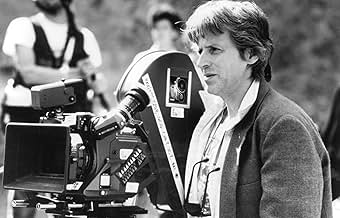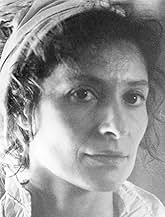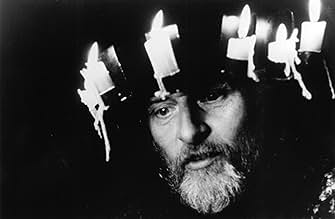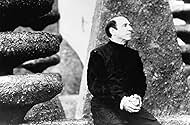IMDb RATING
5.8/10
3.2K
YOUR RATING
Nostradamus (1503-66) was a French doctor, astrologer and seer during the Inquisition, successful in treating patients during an outbreak of plague.Nostradamus (1503-66) was a French doctor, astrologer and seer during the Inquisition, successful in treating patients during an outbreak of plague.Nostradamus (1503-66) was a French doctor, astrologer and seer during the Inquisition, successful in treating patients during an outbreak of plague.
Maia Morgenstern
- Helen
- (as Maja Morgenstern)
Oana Pellea
- Landlady
- (as Oana Pelea)
- Director
- Writers
- All cast & crew
- Production, box office & more at IMDbPro
Storyline
Did you know
- TriviaRutger Hauer and F. Murray Abraham appeared in Surviving the Game (1994).
- GoofsNostradamus is showing his son how to use a divining rod to find underground water and says that there is water 4 meters below, but the metric system wasn't invented until 1799 (roughly 160 years later).
- Quotes
The Mystic Monk: Light the candle at the bottom of your heart.
Featured review
When a film-maker asks me to give credence to the writings of a sixteenth-century charlatan.......
Michel de Nostredame, generally known as Nostradamus, was a sixteenth-century French physician, but is better known today as a reputed prophet and seer. His fame rests on a series of gnomic quatrains which, it has been claimed, contain predictions of future world events, including wars, political changes and natural disasters. The problem is that his quatrains are written in a language so obscure that they can be interpreted to mean virtually anything. Those who seek to interpret them generally do so with the benefit of hindsight, seeking to prove that Nostradamus predicted World War II, the atomic bomb, 9/11 or whatever; those seeking to use his works to foretell events which have not yet happened tend to come badly unstuck. Even when a particular quatrain can be "proven" to have predicted a particular event, this is normally done with the help of some creative rewriting or creative mistranslating of his words. (Anyone with any knowledge of the French of the period can find some spectacular examples of this on the internet, particularly those interpretations which try to prove that by "Hister"- a Classical name for the River Danube- Nostradamus meant "Hitler").
The obscurity of Nostradamus' prophecies was quite deliberate; had he clearly and unambiguously foretold specific events which then failed to occur, his reputation as a seer would have been destroyed for ever. The film, however, would have us believe that he deliberately obscured his meaning in order to ward off the attentions of the Church, although in the sixteenth century attempts to foretell the future were not forbidden and, indeed, astrology was regarded as an intellectually respectable, and theologically permissible, science.
As might be clear from my opening paragraph, I personally do not believe that Nostradamus possessed a supernatural power to foretell the future. (Indeed, I do not believe that any human being possesses or has possessed such a power). In the original French, his verses have a certain surrealist inventiveness, but I have never seen any reason to attribute any other significance to them. This film, however, is quite openly made on the assumption that its hero did indeed possess prophetic gifts; I was left with the definite feeling that Roger Christian was asking me to accept that Nostradamus really was a man tormented by horrifying visions of the future and whose prophecies were intended as warnings to mankind of the fate that awaited them.
Now I normally leave my scepticism about the supernatural at the cinema door; I have never, for example, allowed the fact that I do not believe in witchcraft to prevent me from enjoying the Harry Potter films. Suspension of disbelief, however, is something I find easier to accomplish in the context of a wholly fictional story than in the context of a biography of a real individual. Neither J K Rowling nor the makers of the "Potter" films are, after all, asking me to accept that witchcraft has any existence outside the realm of fiction, but when a film-maker asks me to give credence to the writings of a sixteenth-century charlatan I find it difficult to take his film seriously.
"Nostradamus" has other weaknesses, quite apart from its flawed central premise. Unlike many period dramas, this one is not particularly visually attractive, with dull, muddy colours. The action is slow-moving and at times difficult to follow. I understand that Tchéky Karyo is a well-known and respected actor in France, indeed the winner of a Cesar Award, so I presume that he can act in his own language far better than he can in English. (I have never seen any of his French-language movies apart from "Le Retour de Martin Guerre", in which he only had a small part). In the leading role here he is absolutely horrible, dull and wooden without any convincing attempt to convey emotions. Some of the supporting cast are better, including Julia Ormond as Nostradamus' wife, although I was left with the feeling that F. Murray Abraham had come down a long way since "Amadeus" and Rutger Hauer equally far since "Blade Runner". This was the first of Roger Christian's films I have seen, and I cannot say that it has inspired me with any great desire to explore his work further. 4/10
The obscurity of Nostradamus' prophecies was quite deliberate; had he clearly and unambiguously foretold specific events which then failed to occur, his reputation as a seer would have been destroyed for ever. The film, however, would have us believe that he deliberately obscured his meaning in order to ward off the attentions of the Church, although in the sixteenth century attempts to foretell the future were not forbidden and, indeed, astrology was regarded as an intellectually respectable, and theologically permissible, science.
As might be clear from my opening paragraph, I personally do not believe that Nostradamus possessed a supernatural power to foretell the future. (Indeed, I do not believe that any human being possesses or has possessed such a power). In the original French, his verses have a certain surrealist inventiveness, but I have never seen any reason to attribute any other significance to them. This film, however, is quite openly made on the assumption that its hero did indeed possess prophetic gifts; I was left with the definite feeling that Roger Christian was asking me to accept that Nostradamus really was a man tormented by horrifying visions of the future and whose prophecies were intended as warnings to mankind of the fate that awaited them.
Now I normally leave my scepticism about the supernatural at the cinema door; I have never, for example, allowed the fact that I do not believe in witchcraft to prevent me from enjoying the Harry Potter films. Suspension of disbelief, however, is something I find easier to accomplish in the context of a wholly fictional story than in the context of a biography of a real individual. Neither J K Rowling nor the makers of the "Potter" films are, after all, asking me to accept that witchcraft has any existence outside the realm of fiction, but when a film-maker asks me to give credence to the writings of a sixteenth-century charlatan I find it difficult to take his film seriously.
"Nostradamus" has other weaknesses, quite apart from its flawed central premise. Unlike many period dramas, this one is not particularly visually attractive, with dull, muddy colours. The action is slow-moving and at times difficult to follow. I understand that Tchéky Karyo is a well-known and respected actor in France, indeed the winner of a Cesar Award, so I presume that he can act in his own language far better than he can in English. (I have never seen any of his French-language movies apart from "Le Retour de Martin Guerre", in which he only had a small part). In the leading role here he is absolutely horrible, dull and wooden without any convincing attempt to convey emotions. Some of the supporting cast are better, including Julia Ormond as Nostradamus' wife, although I was left with the feeling that F. Murray Abraham had come down a long way since "Amadeus" and Rutger Hauer equally far since "Blade Runner". This was the first of Roger Christian's films I have seen, and I cannot say that it has inspired me with any great desire to explore his work further. 4/10
- JamesHitchcock
- Jul 30, 2012
- Permalink
- How long is Nostradamus?Powered by Alexa
Details
Box office
- Budget
- DEM 20,000,000 (estimated)
- Gross US & Canada
- $364,164
- Opening weekend US & Canada
- $27,312
- Sep 18, 1994
- Gross worldwide
- $364,164
Contribute to this page
Suggest an edit or add missing content


